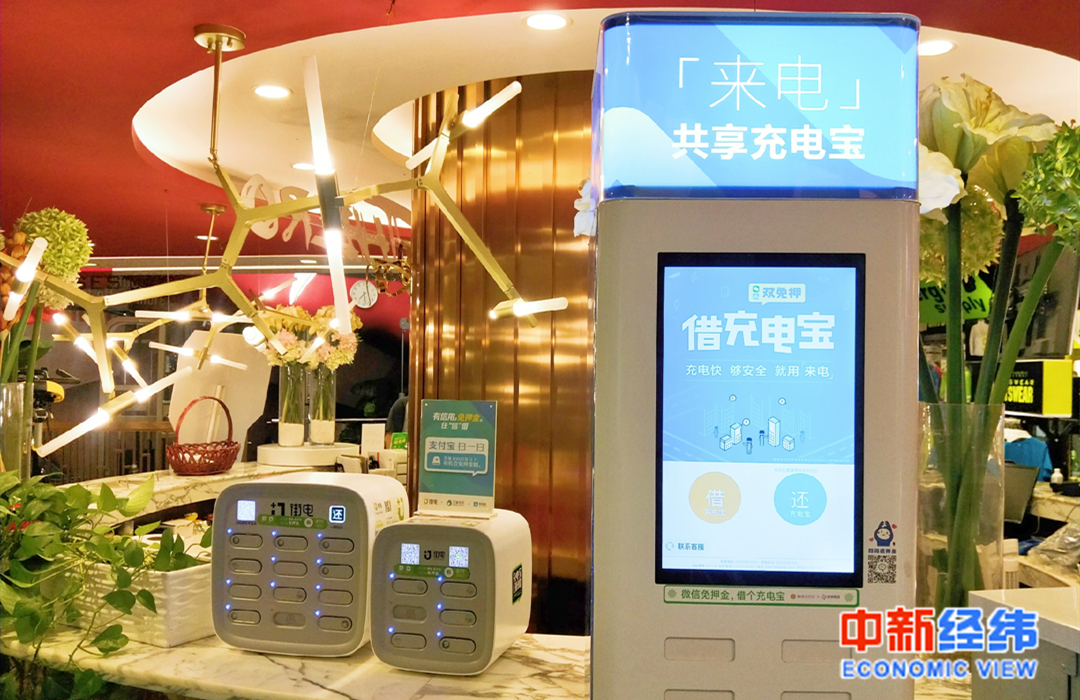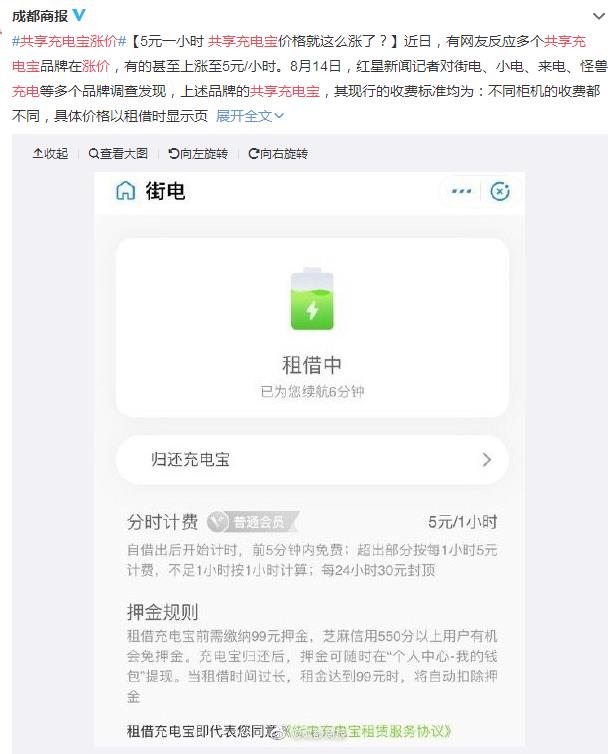Share the charging treasure and increase the price: will you still use it if you spend 8 yuan an hour charging?
Zhongxin Jingwei Client September 8 (Zhao Jiaran) Recently, many consumers have found that many brands of shared charging treasures have seen price increases, and even some stores have risen to 8 yuan/hour, which surprised users.
In addition to sharing charging treasures, bike-sharing brands such as mobike and Little Blue Car have also increased their prices, which is quite different from the situation that they once offered various concessions and seized the market. Is the overall price increase of the sharing economy accidental or inevitable? If consumers don’t buy it, will the price increase become a wrong move?

New Jingwei in the shared charging treasure Zhao Jiaran photo
"Borrowing a few charging treasures is more expensive than buying one."
I don’t know when it started, but the price of the shared charging treasure of "1 yuan 1 hour" has quietly increased.
According to consumers, the prices of some cabinets of Shundian and Monster Charging brands have risen to 2.5 yuan /30 minutes, that is, 5 yuan per hour. CCTV Finance reported that some merchants said that the current maximum charging standard for shared charging treasure has reached 8 yuan per hour, mainly concentrated in areas with large traffic and good location such as scenic spots and ports; And the cabinets priced at 1 yuan per hour are few.

Screenshot Source: Weibo
Some consumers said it was difficult to accept the situation that the price of the shared charging treasure was greatly raised. "If the price generally rises to 5 yuan or even 8 yuan, it may cost tens of yuan to borrow it once, and it is more expensive to borrow it several times than to buy a charging treasure, which is not worth the candle." Ms. Chang, a consumer, said that she recently bought a portable charging treasure to carry with her and tried not to use the shared charging treasure.
Recently, the Zhongxin Jingwei client visited a number of shared charging treasure stores located in Wangfujing business district in Beijing, including street power, small power, incoming calls, monster charging and other brands. It is understood that the hourly price of most shared charging treasures is around 2-3 yuan. In addition, the use price is not marked on the shared charging treasure cabinet, and consumers can only know the charging standard of the current cabinet after scanning the code. During the dinner time when the passenger flow is relatively large, many shared charging treasure cabinets are unattended.
In an interview with Zhongxin Jingwei client, the related staff of Caller Technology said that the price of shared charging treasure is affected by comprehensive factors and is generally measured according to the difficulty of operation and maintenance and the cost.
Talking about the price increase of some stores, the staff said that the shared charging treasure is not a one-size-fits-all full-scene price increase, and there is no clear price increase round, but overall, the industry charging standard is indeed slightly higher than before. Price increases are often caused by a combination of many reasons, such as merchants asking for higher pricing to obtain higher share income, and more importantly, the continuous increase in channel operating costs.
"The rental fee for the shared charging treasure is still a small payment, but the mobile phone is in urgent need of power, so it is basically acceptable for users to adjust the price within a reasonable range." The above staff said.
Street power related staff told Zhongxin Jingwei client that at present, the hourly price of street power sharing charging treasure is mostly within 2 yuan. "At the beginning of this year, the shared charging treasure enterprise has been adjusted from 1 yuan to 2 yuan’s price system. As far as street power is concerned, the price is balanced and stable according to market conditions, and there will be no sharp increase or decline in prices in a short period of time in the future. "
The sharing economy era of "1 yuan 1 hour" has become a thing of the past.
In addition to sharing charging treasures, bike-sharing, which is in the streets, has also experienced a wave of price increases.
Since the first half of this year, brands such as mobike, Little Blue Car and Harrow have adjusted their charging standards in some areas. Taking Beijing as an example, the starting price of a small blue bicycle rose from 1 yuan /30 minutes to 1 yuan /15 minutes, and 0.5 yuan /15 minutes after exceeding the time limit. The starting price in mobike is adjusted to 1 yuan/15min, and the duration fee is adjusted to 0.5 yuan/15min. Hellobike’s new charging rule is also 1 yuan /15 minutes. Some netizens have calculated that riding an hour will cost 4 yuan the most, which is more than taking a bus.
At the same time, some consumers reported that the damage probability of bike-sharing in some areas increased instead of decreasing. Miss Li, a citizen of Beijing, said that she often encountered broken cars or bicycles with incomplete functions when commuting recently, and she was more concerned about the quality guarantee of vehicles than the price. "Now finding a car that is trouble-free and easy to ride is like finding a treasure. Sometimes you can’t ride several cars in a row, which is too time consuming. If we can deal with bad cars in time and ensure the quality, it is acceptable to increase a few dollars. "
In the poll "bike-sharing is more expensive than a bus, can you ride it?" sponsored by official website Weibo of Zhongxin Jingwei, netizens who chose "No" accounted for the highest proportion, accounting for 36.6%, followed by "It depends", accounting for 32.2%.

Bike-sharing Zhongxin Jingwei Zhao Jiaran photo
Consumers have shown different attitudes towards the sharing of charging treasures, the price increase in bike-sharing and the status quo that the "one hour in 1 yuan" era is gone forever. In the discussion on social media, some netizens believe that enterprises need income to operate for a long time, and the price increase is understandable; Some netizens also pointed out that such shared products are not just needed, and will be replaced when the price/performance ratio is too low.
Jinyi should strive to be your light: I thought it was convenient and cheap before, so I didn’t worry about running out of electricity without charging treasure. Now that prices are soaring, I’d rather buy a small charging treasure. Now there are many styles of charging treasures and the price is not high.
Snow white: I used to rely on sharing, but now the price increase is too fierce and I can’t afford it.
The first impression: the price increase visible to the naked eye, many times because there is no place to return the charging treasure in the popular location, in order to find it for a long time, it costs money.
Fat pigeon paper Xiansen: Sharing provides speed, convenience and cheapness. Isn’t that enough? You still have to enjoy free to be happy?
Lv Jun byr: People are not profitable. Where can I get the money to continue to provide services for you?
Is the next step of price increase profitable or "cool"?
According to the "China Sharing Economy Development Annual Report (2019)" released by the National Information Center, the transaction scale of China’s sharing economy in 2018 was 2,942 billion yuan, an increase of 41.6% over the previous year; The number of participants in the sharing economy is about 760 million, and the number of participants in providing services is about 75 million, an increase of 7.1% year-on-year. At the same time, the scale of direct financing in the sharing economy in 2018 was about 149 billion yuan, down 23.2% year-on-year. The report pointed out that after the rapid development in previous years, the development speed of the sharing economy in the field of life services has slowed down.
Some insiders believe that the sharing economy is cultivating users’ consumption habits, and the price increase at this time reflects that the sharing economy is coming out of the primary stage of "price war". As for whether consumers accept the price increase, it depends on whether the service of the sharing enterprise can meet the needs of consumers. If we only keep an eye on the price increase without improving the standard of service, it may be "cool" instead.
Li Xiaohua, a researcher at the Institute of Industrial Economics of China Academy of Social Sciences, said in an interview with Zhongxin Jingwei that the sharing economy has entered a relatively rational and mature stage, and the industry pattern tends to be stable.
Regarding the current price increase trend of shared charging treasure and bike-sharing enterprises, Li Xiaohua pointed out that the price increase is an inevitable process. "At present, the price increase of merchants may also be testing the acceptance of consumers and establishing their own adjustment mechanism. If the number of users drops sharply, the merchant may adjust the price again. If the price is set too high, or a new enterprise enters the market, compete at a lower price. "
Li Xiaohua pointed out that the sharing economy will form a more dynamic and differentiated pricing trend in the future. "Just as the price of online car will be adjusted in real time during peak hours and holidays, bike-sharing and shared charging treasure can also determine the specific price according to the relationship between supply and demand. For example, during major festivals, the number of customers in shopping malls and restaurants has increased sharply, and the number of people using charging treasures has increased, so the real-time price of shared charging treasures can be raised accordingly; On the contrary, prices can also drop during periods of less demand such as working days. " (Zhongxin Jingwei APP)